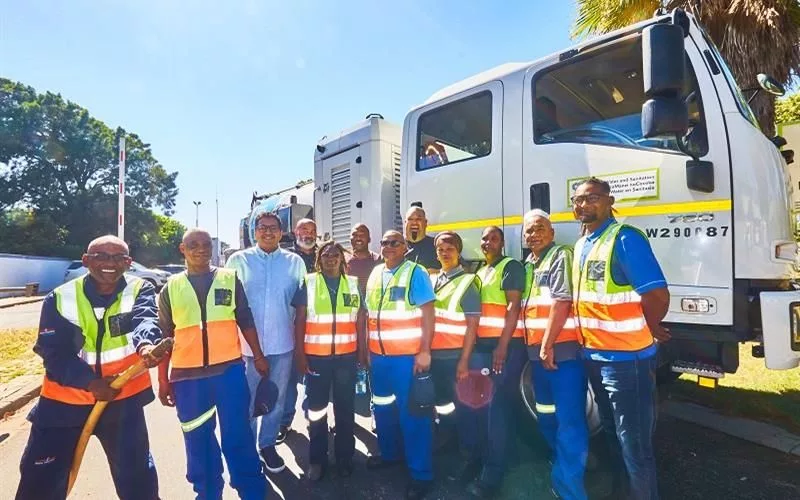The Western Cape Government is taking a bold step towards tackling gender-based violence and power outages by distributing load shedding relief kits to GBV survivors. This move not only provides temporary solutions during power outages but also symbolizes the government’s commitment to fostering resilience amid adversities and addressing societal challenges. The government’s comprehensive approach to the issue highlights the interconnected nature of social and infrastructural challenges and serves as a testament to the potential of innovative and all-encompassing strategies to effect tangible change in individuals’ lives.
Government distributes load shedding relief kits to gender-based violence survivors as part of the Western Cape Energy Resilience Programme, offering temporary solutions during power outages and emergency funds to municipalities. The initiative showcases the government’s commitment to fostering resilience amidst adversities and addressing societal challenges. It serves as a testament to the potential of innovative, compassionate, and all-encompassing strategies to effect tangible change in individuals’ lives.
Government’s Bold Step
In a remarkable move to tackle the dual problem of gender-based violence (GBV) and power outages, also known as load shedding, the Western Cape Government, under the leadership of Premier Alan Winde and Minister of Social Development, Sharna Fernandez, took a decisive step on November 28, 2023. They set out to distribute load shedding relief kits to GBV survivors, a move that not only solves an urgent issue but also holds profound symbolic value.
This endeavor forms part of the extensive Western Cape Energy Resilience Programme, which aims to assist those most vulnerable during such crises. The program takes a versatile approach to the problem, offering temporary solutions during power outages and granting emergency funds to municipalities to ensure critical services continue without interruption. The relief kits are one tangible aspect of this initiative.
The handover of these kits was planned to occur at the Western Cape Department of Social Development offices on Mark Street, Atlantis, from 1:00 pm to 2:00 pm. The choice to distribute the kits directly from a government institution underscores the value placed on this project.
Symbolism and Practicality
The load shedding relief kits hold meaning beyond their practical functionality. They represent a government actively engaging in helping its most vulnerable constituents during challenging times. By focusing on GBV survivors, the government delivers a robust message of support and unity to those who have suffered unspeakable trauma.
Additionally, it reflects the government’s commitment to fostering resilience amidst adversities, whether they are energy-related or societal. The interweaving of responses to load shedding and GBV highlights the interconnected nature of social and infrastructural challenges.
The initiative is part of a larger governmental plan that strives to deliver a range of services to residents, including health, education, retirement, and end-of-life care. It further extends support to businesses and foreign nationals, emphasizing the inclusiveness of the government’s endeavors.
Moreover, the Western Cape Government’s strategy is not merely reactive but proactive. It aims to establish a sturdy system that can weather shocks, be they power shortages or social issues like GBV.
The Broader Picture
However, the dissemination of load shedding relief kits is not a cure-all for the entrenched problems of GBV and energy shortages. It must be recognized as a component of a larger, more intricate puzzle. The remedy demands a comprehensive approach that deals with the root causes of these issues, from gender inequality to energy infrastructure.
The Western Cape Government’s initiative is a promising stride forward, showcasing the potency of governmental action in facing the trials of our era. It serves as a testament to the potential of innovative, compassionate, and all-encompassing strategies to effect tangible change in individuals’ lives.
1. What is the Western Cape Government doing to tackle gender-based violence and power outages?
The Western Cape Government is distributing load shedding relief kits to gender-based violence survivors as part of the Western Cape Energy Resilience Programme, offering temporary solutions during power outages and emergency funds to municipalities.
2. What is the significance of the distribution of load shedding relief kits?
The load shedding relief kits hold meaning beyond their practical functionality. They represent a government actively engaging in helping its most vulnerable constituents during challenging times and reflect the government’s commitment to fostering resilience amidst adversities, whether they are energy-related or societal.
3. What message does the distribution of load shedding relief kits convey to GBV survivors?
By focusing on GBV survivors, the government delivers a robust message of support and unity to those who have suffered unspeakable trauma.
4. What other services does the Western Cape Government provide to its residents?
The Western Cape Government strives to deliver a range of services to residents, including health, education, retirement, and end-of-life care. It further extends support to businesses and foreign nationals, emphasizing the inclusiveness of the government’s endeavors.
5. Is the distribution of load shedding relief kits a cure-all for gender-based violence and power outages?
No, the distribution of load shedding relief kits is not a cure-all for the entrenched problems of gender-based violence and energy shortages. It must be recognized as a component of a larger, more intricate puzzle. The remedy demands a comprehensive approach that deals with the root causes of these issues, from gender inequality to energy infrastructure.
6. What does the Western Cape Government’s initiative showcase?
The Western Cape Government’s initiative is a promising stride forward, showcasing the potency of governmental action in facing the trials of our era. It serves as a testament to the potential of innovative, compassionate, and all-encompassing strategies to effect tangible change in individuals’ lives.








